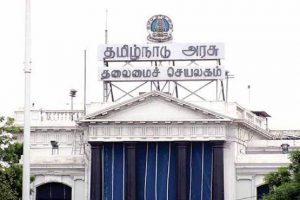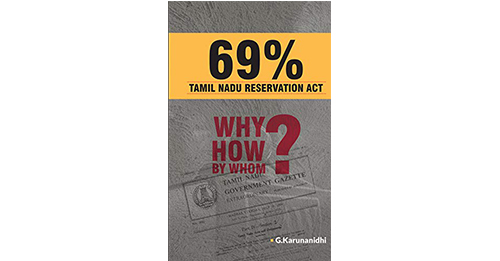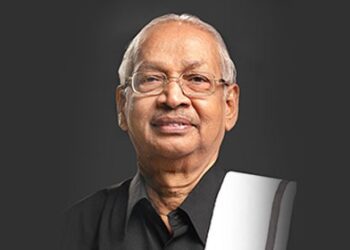V. Kumaresan
Tamil Nadu has been the pioneering State on social justice front since the days of British rule in India. The Dravidian Party has created many precedents in the path of social liberation, participation and empowerment. Its effects have not only been beneficial to Tamil Nadu but also the country at large. Reservation for the oppressed is the definitive pathway to ensure equality. The quantum of reservation must be in proportion to the population of the deprived sections. Tamil Nadu is far ahead of the other States in dispensing social justice. With the passage of Reservation Act of 1994, 69 per cent reservation in education and jobs being provided to the Scheduled Castes, the Scheduled Tribes and Other Backward Classes, Tamil Nadu has proved its progressive leadership.
This was possible only through the continuous and sustained initiative and protective efforts taken by Dravidar Kazhagam (DK) founded by Periyar E.V. Ramasamy (1879-1973) which is the parent organization for all the Dravidian parties in the State.
The ideological, legal and logistic support rendered by Asiriyar Dr. K. Veeramani as the chief of DK was the prime force behind the enactment of 69 per cent Reservation Act. The following brief history of reservation policy would explain the significance of the Act of Tamil Nadu.

* After striking down of the Communal G.O. of Madras State by the Supreme Court in 1951, the Indian Constitution was amended due to the wide spread mass struggle mobilised and led by Periyar. Thereby insertion of Article 15(4) enabled the continuity of reservation to the deprived sections, not only of the State but of the whole of India.
* Consequently the States formulated their own reservation policy and issued G.O.s to the effect.
* In Karnataka (formerly Mysore State), the reservation policy of the State was challenged in 1962 on which the apex court pronounced its verdict in Balaji case. The content of the judgment covers one obiter dictum that the total reservation for the deprived not to exceed 50 per cent. It was not an implementable direction, as it was only a passing reference.
* Many States considered ‘the passing reference’ (obiter dictum) of Balaji case as a direction itself and confined their policies within the total reservation of 50 per cent.
* In Tamil Nadu the quantum of reservation for the oppressed sections was enhanced systematically and the total reservation exceeded 50 per cent in 1980.
* In 1993, in Indra Sawhney case, popularly known as ‘Mandal case’ the Supreme Court ratified the 27 per cent reservation as valid for OBC in the services of Central government and its undertakings. But the judgment said the total reservation must not exceed 50 per cent.
* Without taking cognizance of the special circumstances to exceed the 50 per cent reservation laid in Mandal case, the total 69 per cent reservation that prevailed then in Tamil Nadu was challenged in the Court of Law.
* In order to protect the 69 per cent reservation, Dravidar Kazhagam gave suggestions to the Chief Minister of Tamil Nadu, Ms. J. Jayalalitha.

* The provisions of reservation to the oppressed sections come under Fundamental Rights in Part III of the Indian Constitution. Articles 15(4), 16(4), 19 and 29(2) under ‘Fundamental Rights’ deal with reservation. The Fundamental rights are justiciable rights and the ceiling on total reservation was pronounced by the apex court in Indra Sawhney case. At that time reservations were executed either through Government G.O. (General order) or O.M. (Office Memorandum).
* Part IV of the Indian Constitution has ‘the Directive Principles of State Policy’ in which there are Articles that spell out the necessity for the cause of reservation. The provisions speak about the direction for the State Governance but they are not enforceable through court of law. Hence for the implementation of the directives, no one could approach the court for its enforceability.
DK’s Initiatives
* A search into the Constitution for provisions to protect the 69 per cent reservation led to the discovery of Article 31(B) and 31(C).
What are the features of these provisions?
Article 31(C) speaks about the Saving of laws giving effect to certain Directive Principles – Notwithstanding anything contained in Article 12, no law giving effect to the policy of the State towards securing “all or any of the principles laid down in Part IV shall be deemed to be void on the ground that it is inconsistent with, or takes away or abridges any of the rights conferred by (Article 14 or Article 19) and no law containing a declaration that it is for giving effect to such policy shall be called in question in any court on the ground that it does not give effect to such policy:
Provided that where such law is made by the legislature of a State, the provisions of this Article shall not apply thereto unless such law, having been reserved for the consideration of the President, has received his assent.
Article 31(C) enables the provisions under Directive principles becoming a law, thereby becoming enforceable
Article 31 (B) speaks about Validation of certain Acts and Regulations. – Without prejudice to the generality of the provisions contained in Article 31-A, none of the Acts and Regulations specified in the Ninth Schedule nor any of the provisions thereof shall be deemed to be void, or ever to have become void, on the ground that such Act, Regulation or provision is inconsistent with, or takes away or abridges any of the rights conferred by, any provisions of the Part, and notwithstanding any judgment, decree or order of any court or tribunal to the contrary, each of the said Acts and Regulations shall, subject to the power of any competent Legislature to repeal or amend it, continue in force.
31(B) enables the protection of Acts by its inclusion in IX Schedule of the Constitution and it is immune to judicial review.
The provisions that speak about reservation under Directive Principles of State Policy that were explored for the enactment of 69 per cent Reservation Act of Tamil Nadu are Articles 38, 39(B), 39(C) and 46 of the Constitution.
DK suggested to the State Government of Tamil Nadu as follows:
Since the introduction of Indian Constitution, no enactment was made for reservation. Besides no reservation policy was framed on the basis of the Directive principles of the State policy. The reservations were implemented only through the executive orders of either Union Government or State Governments.
* For the first time steps have to be taken to bring an Act exclusively for the cause of reservation. The proposed Act must be oriented on the Constitutional provisions under Directive principles of State Policy for the cause of Reservation.
Such an Act has to be made under the Article 31(C) that comes under the Chapter, ‘Fundamental Rights’ but meant for the Saving of laws giving effect to certain direct principles. Such connectivity between the constitutional provisions make the provisions of reservations in Directive principles of State Policy as implementable. The Bill passed by the State legislature has to seek the assent of the President of India for it to become Act. This is the significance of the suggested 69 per cent Reservation Act of Tamil Nadu.
The 50 per cent ceiling on total reservation decided by the Supreme Court in Indra Sawhney case based on the arguments of the executive orders of the Union Government reckoning the Constitutional provisions under Fundamental Rights, prevailed then in 1992.
But the Special Act of Tamil Nadu had to be legislated after the delivery of the judgment, based on the provisions of ‘Directive principle’ and made justiciable as Fundamental right provisions.
Such is the specialty associated to the 69 per cent Reservation Act of Tamil Nadu.
One more significant protection was also proposed for the Act.
By way of abundant caution the TN Reservation Act had to be placed in IX Schedule of the Constitution to get immunity from judicial review as per Art.31(B).
The suggested State Act would become effective with the assent of the President and by the inclusion of the Act in IX Schedule through a Constitutional Amendment.
DK’s chief Asiriyar Dr. K. Veeramani’s suggestion on the above line did not stop with mere suggestions but with due insistence and continuous follow up with Ms. Jayalalitha, then Chief Minister of Tamil Nadu. The Chief Minister convened for a special session exclusively to move a Bill in the Tamil Nadu Legislative Assembly. The Bill was passed unanimously. With the assent of President, the passed Bill became the Tamil Nadu Act 45 of 1994.
The Act was sent to the Union government by the State for its presentation in Parliament and inclusion in IX Schedule through constitutional amendment. Parliament also passed the Amendment Bill unanimously by the members of all the political parties without any discussion at a time when the proceedings of the Parliament was in turmoil over Harshad Mehta scam in 1993. It was the 76th Constitutional Amendment.
The process started with the passing of the Bill in Tamil Nadu Legislative Assembly on 31st December 1993. On 31st August 1994 the Parliament passed the Constitution Amendment Bill and received the President’s assent.
* In Tamil Nadu, the total reservation had exceeded 50 per cent to the level of 68 per cent from 1980 onwards.
* The reservation had exceeded by 1 per cent more (exclusively for the Scheduled Tribes) with the total reservation enhancing to 69 per cent since 1989.
* The Special Reservation Act 1994 has got retrospective effect that validated the exceeded level of 68 per cent since 1980.
* As per Art.31(B), only the Land ceiling legislations enacted by the States were included in IX Schedule to acquire immunity from judicial review. For the first time ‘69 per cent Reservation Act’ was included in IX Schedule through the 76th Constitutional Amendment.
The consistent and committed efforts initiated and followed by DK’s chief Asiriyar K. Veeramani with periodical suggestions to the Tamil Nadu State Government manifested as the historic ‘69% Reservation Act’ of Tamil Nadu in the history of social justice of our country. The significance of the Act and its inclusion in IX Schedule was not realised by many. To-day due to awareness on the part of the oppressed and the State rulers, the precedence and specialty of the Reservation Act is understood in proper perspective. This makes Tamil Nadu a role model for the entire country in the formulation and implementation of reservation policy.






